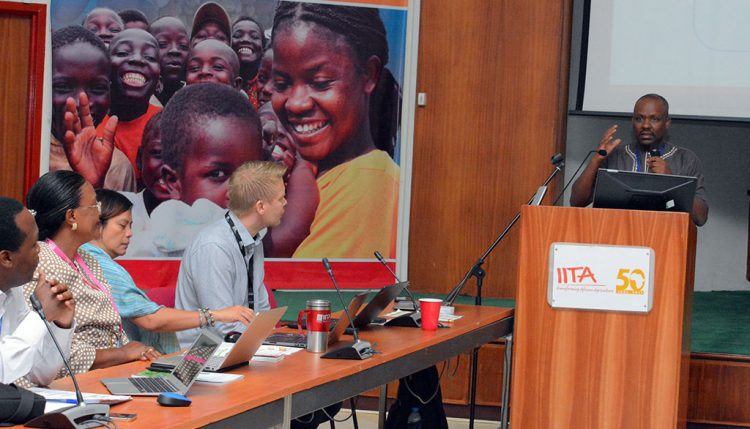
Research Support Services showcase status, achievements, and future prospects
Presentations from units under the Research Support Directorate kicked off Day 3 of R4D Week with presentations on the status of the unit, achievements, and future activities. Various side meetings and training sessions made up the rest of the day.
Tonny Omwansa, Director for Research Support, started with an introduction to the new subdirectorate, explaining the structure of the units under the directorate and reporting lines. In his introduction, Omwansa described an initiative called the Monitoring Evaluation Landing (MEL) platform which is capable of extracting data from many systems which can be pushed to other platforms such as websites for easy access to potential users. The implementation of MEL now facilitates the option of one entry point for data.
Petri Wiren, Head of the new Data and Information Management Unit (DIMU), started off the unit presentations, describing the unit structure and 2017 highlights including the implementation of Office 365 platform, a ticketing system for logging IT support requests called SysAid, activities related to Open Access, and a Human Resources and Finance solution (HURIX), among many highlights. For the future, DIMU is looking at numerous areas including opportunities in improved asset management, mobile solutions in data collection, video conferencing services, and more work on remote sensing where we have access to satellite data from NASA and the European Union.
Next, Katherine Lopez, Head of Communication, started her presentation by explaining the important role of communication in research and in achieving success in terms of creating awareness of IITA’s activities both internally and externally. Some Communication Unit achievements included the strengthened Community of Practice (CoP) consisting of communication practitioners at HQ and the hubs/stations and project communication officers; the development of an Institute communication workbook, communication policy, and communication strategy; increased visibility and coverage of IITA activities and IITA50 celebration; the soft launch of the IITA website; active growth of social media activities and reporting; and media monitoring and engagement with media partners especially based around the IITA50 celebration. Lopez mentioned future activities such as enhancing web presence in areas like websites and social media, more engagement with media partners and public awareness campaigns, and streamlining of communication operations through business orientation and more engagement with the CoP.
Rosern K. Rwampororo, the new Head of the Monitoring & Evaluation Unit, introduced her presentation by discussing the M&E Results Indicator Book and its role in assessing key performance indicators (KPIs). Another set of achievements included the ongoing capacity building in M&E in units as well IITA being represented at the Annual CGIAR MEL CoP Meeting. She also highlighted some challenges in fully implementing M&E at the Institute including lack of budget allocation and staff for M&E, and lack of an enforcement mechanism for projects reporting on applicable KPIs. Looking into the future, she mentioned the provision of M&E technical support service to other Directorates, Platforms, Projects and Hubs; development of standardized tools and guidelines; institutionalization and automation of M&E processes; and conducting data quality assessment on the reported KPIs.
Allan Liavoga, Project Development and Administration Unit (PDAU) Head, described the role of PDAU and its relation to resource mobilization. He discussed the emphasis on proposal development and its respective success rate. Liavoga explained the processes and compliance from the hubs with regard to financial reporting. He mentioned the importance of scientists and the need to reduce administrative load and focus on delivery with the support of PDAU. Liavoga also highlighted the importance of resource mobilization and strategies for improving IITA’s effectiveness in this area. Looking forward, he mentioned that there will be many activities including the following: automation of functions, decentralization of some functions, implementation of a sound feedback mechanism, and more work done on continuous communication with scientists and project managers.

